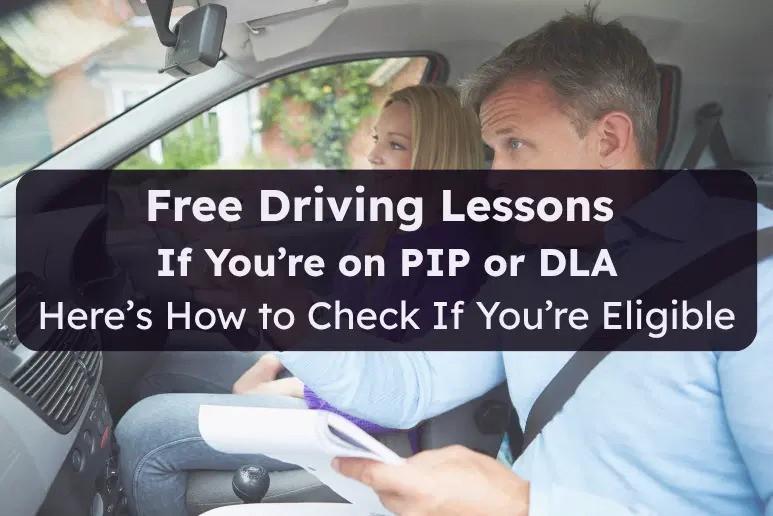All Articles
3 min read
Free Driving Lessons If You’re on PIP or DLA – Here’s How to Check If You’re Eligible
Written by
Purpl
Published on
July 15, 2025

Learning to drive can be a total game-changer. It opens up access to work, education, healthcare, friends, family — and let’s be honest, sometimes it’s just nice to get in a car and go wherever you want without relying on anyone else.
But driving lessons aren’t cheap. And if you’re disabled, chronically ill, or managing your energy and finances day by day, they can feel totally out of reach.
That’s why this scheme is so important — and why barely anyone seems to know it exists.
If you get the higher rate mobility part of PIP or DLA, and you either already lease a Motability car or have one on the way, you might be able to get up to 40 hours of driving lessons completely free. That’s around £1,500 of lessons covered — no strings, no catch, just actual support.
Who’s Eligible For Free Driving Lessons?
To apply for this scheme, you’ll need to meet a few criteria. You must:
- Be getting the enhanced rate mobility part of PIP or DLA
- Have a provisional licence (or be applying for one soon)
- Already lease a Motability Scheme vehicle — or have one due to arrive within the next four months
- Be on a means-tested benefit like Universal Credit, Employment and Support Allowance (ESA), Income Support, or Housing Benefit
If that’s you, you can apply for up to 40 hours of free driving lessons through the Motability Driving Lessons Grant Programme.
You’ll need to show proof of your benefits, Motability lease, and income. Once approved, the lessons will be arranged with a driving school like the AA or BSM, and booked directly through them — you won’t need to pay anything upfront.
Already Have a Licence? There’s Help For You Too
If you’ve passed your test but you’re switching to a newly adapted vehicle, Motability might also cover the cost of a few familiarisation lessons. These help you get confident with things like hand controls or left-foot accelerators, so you can feel safe and in control on the road.
What’s Not Included
This grant doesn’t cover the cost of your theory or practical driving test — just the lessons. But if you’re on Universal Credit or certain benefits, you might be able to get test fee support through your Jobcentre or the Flexible Support Fund. It’s worth asking.
How To Apply
You’ll need to call the Motability Grants team directly on 0800 500 3186 and request the form for the Driving Lessons Grant. They’ll talk you through what you need and how to send it in.
Because the scheme is means-tested, it can take around 10 weeks to process applications — so if this is something you’re thinking about, it’s worth starting early.
You can also read more about it on the official Motability Foundation website.
Other Options If You Don’t Qualify
If you’re not with Motability, or you don’t meet the exact criteria above, all hope isn’t lost. Some other charities and local support services might be able to help.
- Family Fund offers grants to disabled young people up to age 24 — including driving lessons in some cases.
- Carers Trust has limited grant funding for carers and people they support.
- Your Jobcentre might offer help through the Flexible Support Fund if driving would support your return to work or education.
It can take a bit of digging, but if driving would transform your independence, it’s absolutely worth asking for help.
A Final Word From Us
At Purpl, we know the hoops disabled people are made to jump through just to live their lives. But every now and then, there’s a scheme like this — something that genuinely opens doors (and car doors, at that).
Driving is about freedom. It’s about saying yes to more things, on your own terms. If you think you might qualify, now’s the time to apply.
And if you’re not sure, or you’ve already done it and want to share your experience with others in the community — we’d love to hear from you. The more people who know about this, the better.
You deserve support that actually supports you.

Sammi is autistic, has ADHD, and lives with POTS. She’s passionate about disability advocacy, accessibility, and creating spaces where people feel seen, heard, and understood. With a sharp sense of humour and a deep love for community, she speaks openly about the realities of being neurodivergent across all of her personal platforms, always aiming to challenge stigma, spark conversations, and remind others they’re not alone.
Other articles you might like:
Changes to Universal Credit: What They Mean for Disabled People, and Where to Get Support
Understanding Carer’s Allowance: A Guide for People in England, Wales and Northern Ireland
What Support Is Available for Young Carers in the UK? A Complete Guide
Do Disabled People Get Free Prescriptions in the UK? How to Save on Medication Costs
